Makaya McCraven continues to push the envelope with his newest collection of EPs. One of jazz and experimental music's most innovative drummers, the four pieces that make up Off the Record are separate and distinct slices of live improvisation funneled through McCraven's love for capturing real, organic music. "In a time where we're increasingly connected through phones, in a virtual world where you can't really tell what's real or what's fake, there's something special where we come together and share space, there is something special where we are sharing music, art," he says in a press release for the project, his first recorded offering since 2022.
The four EPs are entitled Techno Logic, The People's Mixtape, Hidden Out!, and PopUp Shop. With live cuts ranging from 2015 through this year, the Massachusetts-raised and Chicago-based drummer and composer sidestepped the boundaries of time, genre, or space to compile cuts that felt unique and release-worthy, or were just waiting for the right moment.
Improv is everything on Off the Record. Each track was taken from fully improvised live experiences and later edited by McCraven. "We're about to be making some stuff up," is the crowd's blunt introduction to the PopUp Shop EP as Makaya and crew slide into the arpeggiating circus ride that is "Venice." The rhythm section of McCraven and Benjamin J. Shepherd provides a head-noddingly dense groove for the swirling licks of guitarist Jeff Parker. "Los Gatos" from the same collection is an equally grooving yet distinctly ambient and brain-soothing textural masterclass.
Another one of the many highlights are two loop-forward upbeat Techno Logic cuts, "Boom Bapped" and "Prime," which at times feel like hip-hop beats transmitted to us from some distant intergalactic entity. As the name implies, the former specifically finds such an enjoyable common space between '90s sample-heavy hip-hop motifs and forward-thinking heady jazz club improvisation.
I spoke with Makaya McCraven about his early influences in Western Massachusetts, his focus on creating boundary-free live musical experiences, and the thick skin and nine lives of many jazz 'cats.' This conversation has been edited for clarity and length.
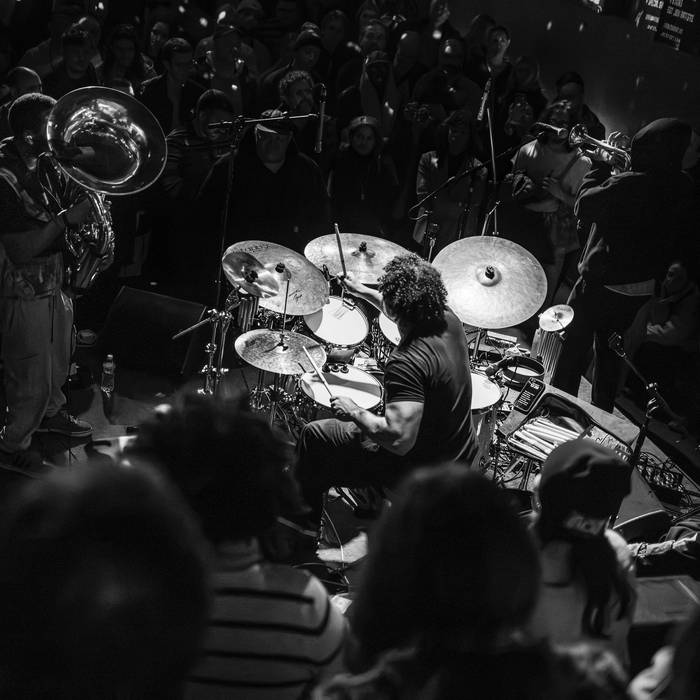
Sam Bradley: When did you realize that you wanted to pursue music?
Makaya McCraven: I think around 13–14 years old. I joined a band with some guys at the high school. That was the first time I was on a project that wanted to write music, was doing gigs, and was gaining a local fan base. That lasted all the way through college, and basically into my early years. I think by the time I was 16 or 17 was when I started to be like, "Okay, maybe this is going to be a full-time career, and if I want to do this, I also want to have my own projects and bands." I started putting on shows under my own name. I'd have a Makaya McCraven Trio gig or a quartet, and I was the musical director.
I mean, from about 19 years old, I worked at a recording studio and a kind of startup label where I was the musical director. At that point, I had already started recording, working on creative projects, and producing records for other local musicians. I produced a record for a piano player named Jeff D'Antona, probably around 2004. And Alecia Chakour, who's now been with Tedeschi Trucks Band for maybe 10 years, I did her debut record all while living in Western Massachusetts. That is also where I started meeting some New York musicians she was beginning to work with. That's around the time I started messing with turntables and things like that on the side. I was always hanging out with DJs, asking them what the hell they were doing.
Sam: Are you still based in Chicago now?
Makaya: I am, yes, but that all happened in Western Massachusetts. I had a whole career as a young musician before I ever moved to Chicago. That actually helped set me up when I moved to this big city with a much more robust scene and a lot more social stuff to navigate. But I had all this stuff going on the East Coast that kind of held me down for two years. I would fly back to the East Coast once a month to do little gigs and sessions until my Chicago career really started to move too fast.
Sam: What was the Chicago scene able to do for you, and how did it strike you as different from Massachusetts?
Makaya: I moved to Chicago because my wife got a job at Northwestern. And to be frank, it was a little bit off my radar, being an East Coaster, you know? But I also grew up in an alternative music scene. I mean, we were in Western Massachusetts in a small college town, but it was rich with a history of jazz, and that's kind of why my father moved us out there. We lived down the road from Yusef Lateef, Archie Shepp, and Marion Brown, all quite provocative, avant-garde, and innovative jazz musicians from a Black American musical tradition. Coming up in Amherst, in a small place away from the big city but with access to those kinds of people, really shaped my view and approach to music. Max Roach taught at UMass when I was a little kid, so I got to meet him, and my dad studied drums with him.
I don't feel like it was always as closely connected to the New York or mainstream jazz scenes. It was coming from a place that was a little bit more Black and not just mainstream, you know what I mean? A little more edgy in that sense. I moved to Chicago, and I found the connection that guys like Archie (Shepp) had with the AACM. I didn't know much about the AACM. I didn't know much about the Art Ensemble [of Chicago] yet. I found a kind of fabric and culture of this music that felt very much at home. I found not only elders to give me some path forward, but also peers who were right in line with all the music I came up with, who were interested in hip-hop and house music just like me.
It was inspiring to come and see the fabric of a whole city, and the decades of culture embedded in it. There were musicians and cats in their 20s who had a wide range of what they understood socially as where the music came from and beyond, which was huge for me. Compared to New York City, which I felt could be overwhelming given its dominant music culture and commercial music scene. It led to a sense of homogeneity or pressure to follow this trend or that, without quite as much space to just be yourself and be creative. Chicago provided something really different than that for me. It's a down-to-earth city; flashiness won't necessarily get you anywhere. I feel like with some other major music markets, maybe there's a little bit more of that kind of thing. Does that make sense?
Sam: It makes a lot of sense. It seems like there is less rigidity there, whereas the longstandingness of jazz in New York has kind of found its footing in tradition.
Makaya: I mean, Chicago's got a longstanding way of things that have been done here, too, but in some ways, is more welcoming. New York City is a beast, and to survive, people do a lot of things. There's a certain type of tough skin. I just saw this meme about New Yorkers that said, "If you're walking on the street, one thing you don't do is look somebody in the eyes." Everybody learns how to mind their business on the train, you know? That's not the only cultural thing that people learn. When you come into the music scene where young people are badass musicians and also hungry, it can create a culture that feels a little aggressive to some people. I know a lot of people find the New York scene, or the jam and session scenes, very intimidating. You have to know how to navigate the social scene.
Sam: I imagine there's a solid musical equivalent of learning not to look people in the eyes that takes a lot of experience. “How do I fit in here without stepping on people's toes and making myself look like an ass?”
Makaya: Not even to not make myself look like an ass, honestly. Sometimes it's like, "How do I walk into this space and not let people step on my toes? How do I walk into space and not let people push me around?" We have a lot of the same culture here in any jam session, but in New York City, it's just a little bit more aggressive. Chicago's not perfect, though.

Sam: What is your relationship with categorization or genre? Is that ever a part of your process?
Makaya: This is a very kind of complicated and layered subject. I guess we're in the post-genre era, right?
Sam: Yeah, I've heard that. It seems like a lot of new things in a given genre are called ‘post.’
Makaya: Right, and that in itself brings us to kind of a crossroads. Does that mean we're done inventing genres? Is every genre from now on a subcategory genre? Why can't we have new genres? What defines the walls of a genre? Is it an era?
It's a commercial category first, and often a band can define a genre or subgenre once established. You look at jazz, and in the post-genre age of jazz, there are so many types of jazz. There are so many different ways that we can define what jazz is and what makes it authentic, and why we can call it that, to the point where they're trying to create new Grammy categories to deal with the fact that it's a difficult crossroad. We have alternative jazz. What is alternative jazz? What does that mean? You know?
So, I think these words have some meaning. In the context of being able to have a healthy discussion about the music, we need some words. So if we get rid of the words, we're also screwed. We have to be able to talk about these within context or in different ways depending on who our audience is and how versed they are in the subject. I would adhere to the idea that jazz can definitely mean an idiom, and have particulars of the style that relate to that idiom in a given time period. I can also have a different definition and call myself a jazz musician in the line of say Miles Davis or Duke Ellington, who both very publicly and openly said, “Don't call my music jazz.” So, in the tradition of the jazz musicians that I want to be like, I also say don't call my music jazz, because it doesn't really fit in the idiom of jazz. I think that's within the tradition of jazz to question labels and think of how we can evolve it.
My conclusion is that it's all kind of made up, right? We can use language to the best of our ability to describe what this is, so we can get people to come to shows or buy the records.
Sam: As you said, it kind of comes down to categorization at the end of the day—how can we market and sell this thing?
Makaya: Yeah, and I, too, am a part of that. I will absolutely play devil's advocate, and I could debate myself all day long on whether that's appropriate. When it comes to your question, though, if it comes to how I want to be creative and if I'm thinking of genre while I'm being creative, then no. I mean, I might be thinking of how certain sounds could relate to certain genres. I can say, "That sounds like a hip-hop beat."
I love the quote, "Writing about music is like dancing about architecture." I forget who said it, maybe Frank Zappa. To do it, we have to be creative. The words only bring us so far, and that becomes the effort for somebody like you to be able to encapsulate ideas and sounds through a medium with limitations. That's one of the beauties of instrumental music, either you're going to describe it by talking distinctly about the chords or the time signatures, being very nuts and bolts, or you're going to have to use really colorful language about how it made you feel and what it drew from and how it flows with history. That stuff is not directly telling me what the music sounds like.
Sam: And that's far from a one-size-fits-all sort of thing, too; person A's context or musical history leads them to much different ideas or categorization than person B. On that train of thought, was splitting this project into the four separate EPs done with different audiences or idioms in mind?
Makaya: I think the overlap there was a kind of feeling that each moment that was recorded was distinctly itself. The group with Ben LaMar Gay and Theon Cross [featured on Techno Logic] really felt like a budding group. I told them I wanted to do this with these recordings and whatnot. I tried to sort of keep that project alive; it was something I've always wanted to release.
Hidden Out! was a series of concerts I put together in Chicago, intended to be recorded into a project. We recorded every week, and I was producing the tracks, but ultimately things took me different ways, and I'm just very open to flow with my opportunities.
Then, lastly, I was celebrating the 10th anniversary of In the Moment. I had like four gigs at New York Winter Jazz Fest, and I wanted to record some of them in the spirit of that record and, say, this Hidden Out! stuff that I hadn't released yet. So we recorded another session with Ben and Theon at Nublu in New York in January of 2025, and recorded a show at Public Records, which is The People's Mixtape. The anniversary celebration really brought me all the way back into my catalog; it reminded me of my effort and my mission to make music in this fashion. It just felt like a good time to put it all into a package of some sort.
I really like playing these intimate improvised concerts, something I get to do a lot less as I play bigger shows. Doing these intimate shows in non-venue, underground spots is for the people, live and imperfect, and it hasn't been edited. Those shows, being there and kind of being watched in the unknown, is a true human experience that happens together, ‘hashtag IRL.’
That's one of the things I'm also trying to highlight in these records. It's like 'this is cool, there are things that happen.' Sometimes these rooms are empty, and really special things can happen in them. Next time you see some wild thing in a corner of a bar somewhere, go hang out. Check it out. Drop in, you know, tell your friends.
Sam: How do you balance preserving those moments with any studio editing that comes later?
Makaya: With the editing process, I'm employing a ton of different types of techniques from overdubs to chopping and looping, so it's really kind of a creative wash. Sometimes I get my hesitations in that process of, you know, "What do I want to do here or there?" I've tried to pull that all back and be like, "I'm just going to try to make something that I think sounds dope." Also, sometimes it's done to button tracks up so they have a beginning, middle, and end. When we play the shows that I'm getting the source material for, we have no script, completely free.
Sam: At the risk of sounding buzzword-y, what is your relationship with incorporating digital technology into your music? It seems like the human spirit is very much your focus, despite the AI era we live in and people's waning attention spans. How do you feel about staying grounded in the humanism of it while also allowing technology to advance the overall product?
Makaya: That's another dense subject. You've got AI bands out here dropping records, getting tons of streams, people are all afraid about the music industry, and all of this stuff. My counter is, you know what an AI band can't do? They can't play a live show. They can not participate in this experience when we are together as humans, right? Standing in a room, experiencing something together, breathing the same air, whether in sound or silence. A moment of silence feels like something. I don't think I'm making that up. There's something unique that happens, that's very simple and slowly being taken from our worlds.
I think there's some fear that all our social media will go away, that the internet will shut down, and that the power will go off. We got the preppers out here, right? I mean, maybe if the power grid goes off, I don't know what goes down, but I can tell you I lived in a time when shit still worked without the internet. Now that we're stuck absorbing everything through screens, particularly in a space where you can't tell what's real or not, I think it's a dangerous place for us to be. So I am very much trying to highlight these experiences, something live and something where we share space with our neighbors.
Improvising is not unique to jazz. To me, improvising is an expression of the natural state of being. We are all just living in real time, trying to figure shit out. That binds every single person and every living being.
I don't want to say with my ego that I know what all the best music is going to be, or I can write this music that's going to touch people for sure, and I'm going to compete with AI. What I can do is set the environment for something special to happen, for something I don't know will happen. By improvising, doing all that, playing music in front of real people, and being vulnerable, we are doing things that AI won't be able to touch.
Sam: And one would hope in time, people, by and large, become more focused on experiencing that sort of thing. The human experience is not binary.
Makaya: But you know, people are fickle too, right? An industry is going to go this way, and people are going to be like, "Whoa, what about this other thing?" I remember this young woman in San Francisco who worked in virtual reality coming to the show, and saying, "This show was so amazing, I was having so many ideas of how to bring it back to work, how we could use sound." I was like, yeah, it sounds pretty amazing in real life. It's already here.
Another young person came to the show and said, "That was so amazing. I've never been to a show like this. My professor made us come out. We're getting credits. I've never really seen live music." She said, "I totally get why live music is a thing," and I thought that was a little sad. But generationally speaking, I think there are a lot of young people who could be blown away by what real life has to offer. I think this music has a very powerful place in the future, because it is antithetical to the virtual world we are witnessing. When you could show me an AI band that can play convincingly out and take me for a ride emotionally, then maybe you could get me to shut up. And again, that's coming from someone who likes to use technology in music.
Sam: That's true, and it must be said that so much of the music we love is a direct byproduct of enhanced technology over the years. It also changes the accessibility for getting into it, now that a kid can just make beats or record tracks on a laptop.
Makaya: Yeah, I'm with you. We didn't even have recorded music until, like, 100 years ago.
Sam: Is there anything you hope people take away from the record?
Makaya: There's a lot of conceptual stuff in the record, but that's also more about the process. At the end of the day, I'm just trying to make some music that people will vibe to. With Off the Record, the theme is very much about the process and the spaces in which we recorded this, and the participatory nature, both of the musicians and the audiences.
Twenty years ago, when I was working on my first things, which are probably unreleased, I had some confusion about the changing jazz market, in a sense. I was really connected with a lot of DJs, finding jazz fans who were crate diggers and beatmakers. I learned that they had a completely different culture of people who were really engaged with jazz, especially the avant-garde, who knew more than some jazz fans you might see at a traditional club. I think recognizing that cross-section of like-minded consumers like myself was huge. I just had a fan . . . it was very sweet . . . but they gave me a hard drive with 950 songs they compiled around their love of J Dilla. I was very grateful, but I'm also like, "What the hell am I going to do with 950 songs, dedicate the next 10 years of my life learning all this music?" (Laughter)
Check out more like this:
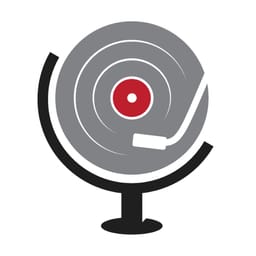 The TonearmLawrence Peryer
The TonearmLawrence Peryer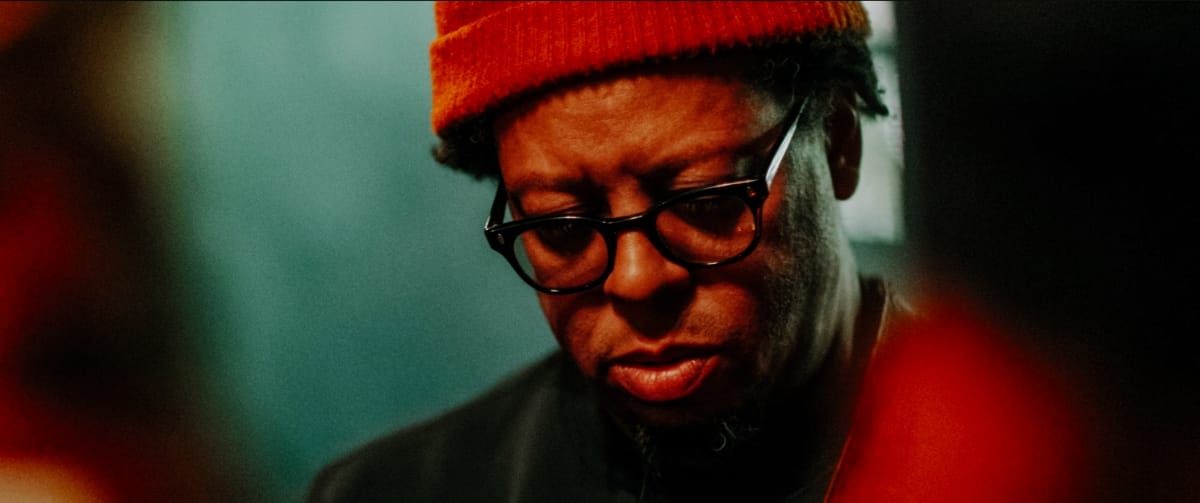
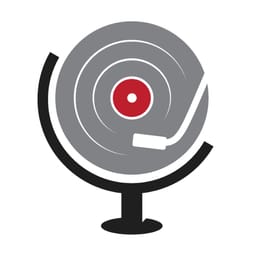 The TonearmLawrence Peryer
The TonearmLawrence Peryer


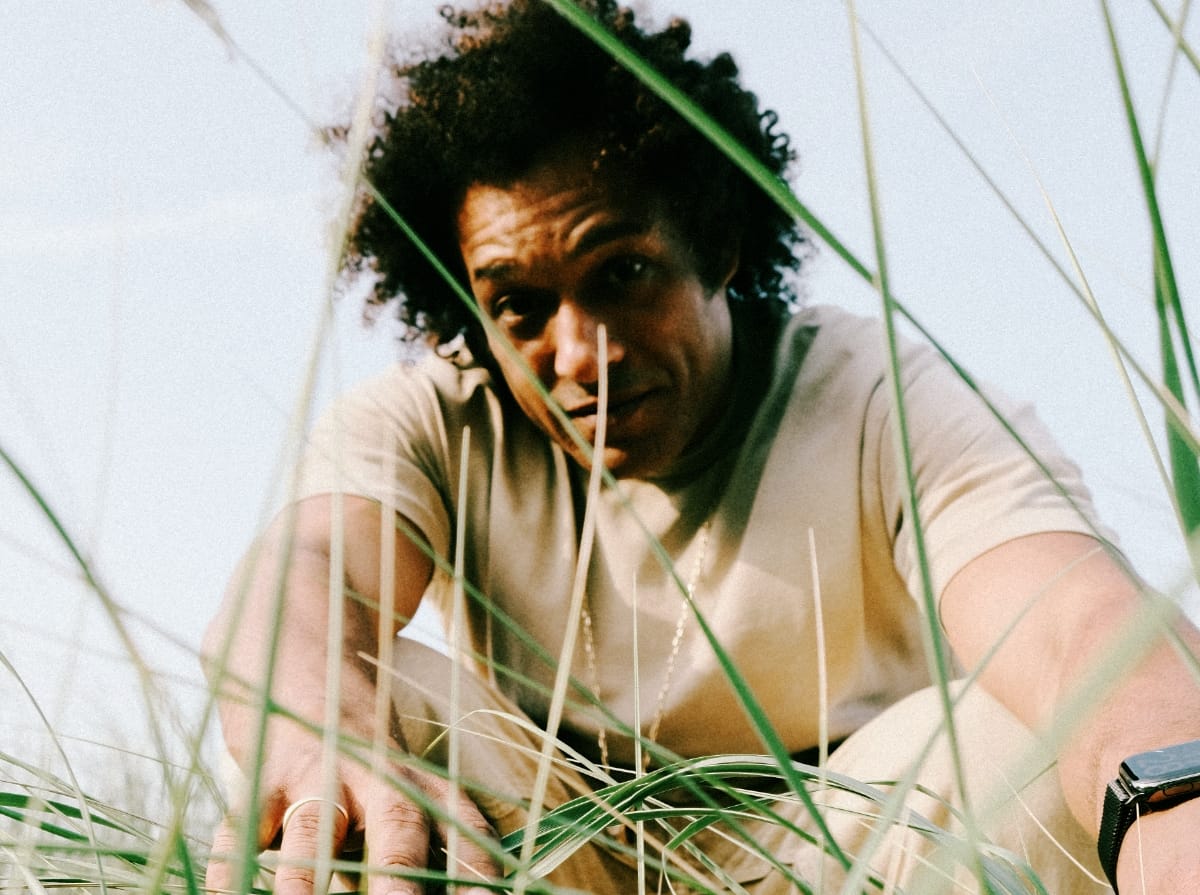
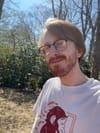
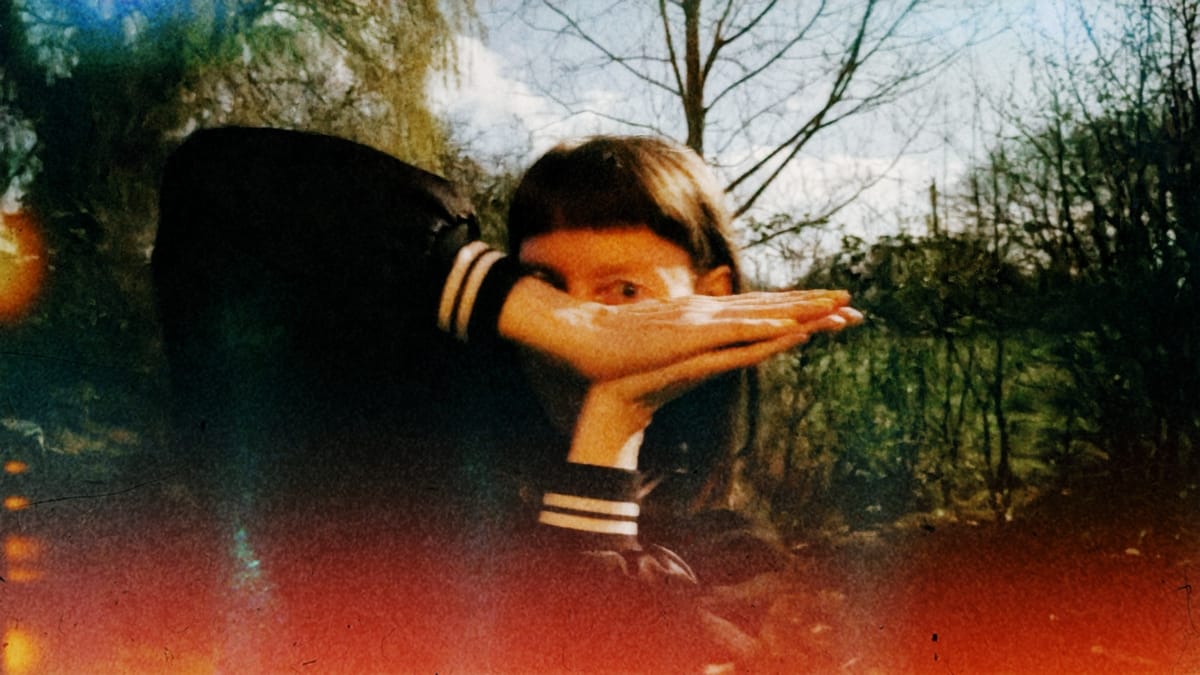
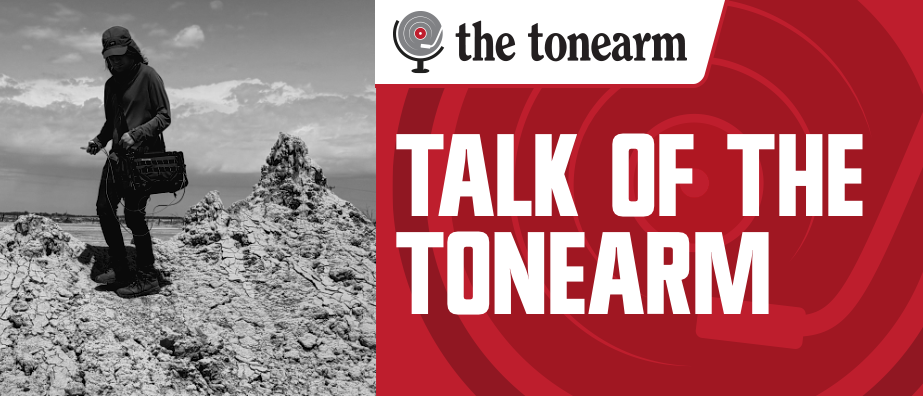
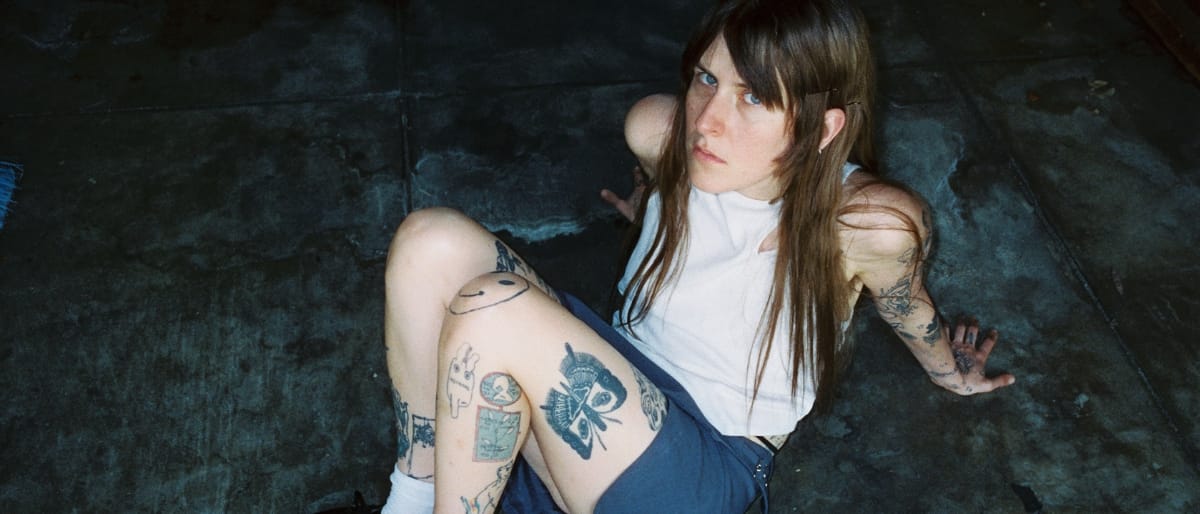
Comments